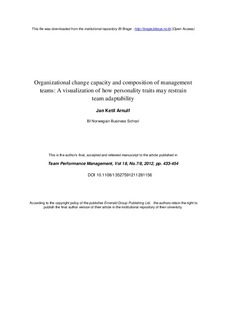| dc.contributor.author | Arnulf, Jan Ketil | |
| dc.date.accessioned | 2013-04-23T10:57:56Z | |
| dc.date.available | 2013-04-23T10:57:56Z | |
| dc.date.issued | 2012 | |
| dc.identifier.issn | 1352-7592 | |
| dc.identifier.uri | http://hdl.handle.net/11250/93772 | |
| dc.description | This is the author's final and acceptet version of the article, post refereeing. Publisher's version is available at www.emeraldinsight.com | no_NO |
| dc.description.abstract | This study explores ten management teams over 33 monthly financial reporting terms and a critical incident requiring readjustment of business. Using financial data, market information and personality data, it is shown that scale content and previously used measures such as intra-team means and variance are of little value in explaining performance. Instead, the presence of all strong traits in the form of maximum values has a tendency to push the teams toward stereotypical business behaviors, restricting adaptation in times of crisis. The exceptions are emotional stability and cognitive ability which support adaptation in a way corresponding to Belbin’s original model. This study argues that the content of the actual traits may be less important to adaptation than a rigidity stemming from the tendency of personality traits to stay constant across contexts, possibly influencing situational adaptability. An alternative to the process loss mechanism traditionally attributed to heterogeneity is suggested. Theoretical and practical implications are discussed. | no_NO |
| dc.language.iso | eng | no_NO |
| dc.publisher | Emerald | no_NO |
| dc.subject | Management teams | no_NO |
| dc.subject | Personality trait composition | no_NO |
| dc.subject | Cattell’s 16PF5 | no_NO |
| dc.subject | Heedfulness | no_NO |
| dc.subject | Adaptability | no_NO |
| dc.subject | Organizational change | no_NO |
| dc.subject | Personality | no_NO |
| dc.subject | Team management | no_NO |
| dc.title | Organizational change capacity and composition of management teams : A visualization of how personality traits may restrain team adaptability | no_NO |
| dc.type | Journal article | no_NO |
| dc.type | Peer reviewed | no_NO |
| dc.source.pagenumber | 433-453 | no_NO |
| dc.source.volume | 18 | no_NO |
| dc.source.journal | Team Performance Management | no_NO |
| dc.source.issue | 7/8 | no_NO |
| dc.identifier.doi | 10.1108/13527591211281156 | |
